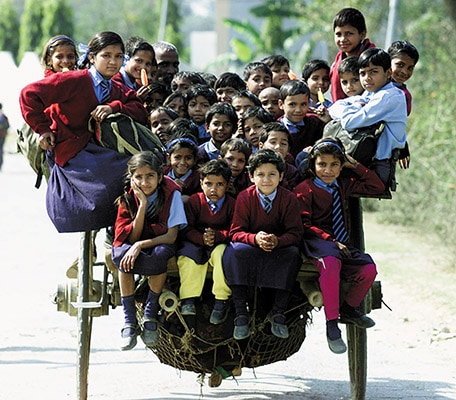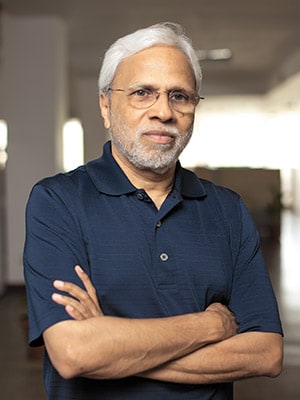
Dileep Ranjekar: Our Biggest Challenge is to Improve Teaching competence
While we have taken the school to children in over 99 percent of our villages, the quality and equity of education has remained elusive
Dileep Ranjekar
Profile: Dileep Ranjekar (Co-CEO) has been an integral part of the Azim Premji Foundation, right from its inception in 2001. Ranjekar joined Wipro from campus in 1976 and played an important role in its transformation from a vegetable oil maker to a global IT company.
In 1950, we as a nation made a constitutional commitment to build a socialistic, secular and democratic society to secure justice, liberty and equality on several attributes. We committed to be a nation where the poorest feel ownership towards the country, all communities live in perfect harmony, there is no untouchability and women enjoy the same rights as men. After 66 years of independence, we have hardly progressed on our constitutional promise. Our performance across various economic, developmental and social indicators is abysmal. More importantly, there are serious challenges on equity, justice and care for human beings.
It is well accepted that education is probably the most non-violent medium for bringing about social change. In our country, the state has a constitutional responsibility to ensure quality education for all. While we have made significant progress in the last 20 years to take the school to children in over 99 percent of our villages, quality and equity of education has remained elusive.
In 1986, through an act of Parliament, the state brought out the National Policy for Education, defining goals that were consistent with our constitutional promise. The policy has been supported by the National Curricular Framework, revised from time to time, elaborating the purpose, process and assessment of education. Unfortunately, neither the policy nor the curricular framework has reached the seven million people deployed by the government in 1.4 million schools across the country.
There are several issues involved in the non-delivery of quality education for all, such as the lack of political will, absence of accountability in the delivery system, poor-quality teacher education and inadequate budgets. However, among the most critical actions required is enhancing the competence of people engaged in education.
Pre-service Teacher Education
Given our diverse complexities and the socio-economic matrix, it is absurd to expect that we can prepare a high-quality teacher through a 10-month Bachelor’s in Education (B.Ed) programme after a poor-quality graduation process. What is worse, even the given framework is not delivered with integrity by over 70 percent of the private teacher education institutions. The fact that less than 10 percent of the teachers cleared the national teacher eligibility tests is evidence of that.
We have to strengthen the B.Ed degree, making it at least a two-year programme and simultaneously design a five-year programme to be entered after Standard XII. This would help improve aspects such as subject matter knowledge, education perspective, reflective teaching and learning practices, and meaningful student assessment.
Prepare School Principals
World over, research has established that a ‘school leader’ has the highest influence on the quality and culture of the school. However, we do not have a formal process of developing school leaders. It seems absurd that while teachers cannot be appointed without a B.Ed degree, there is no such separate certification required for principals. We need to launch a programme for the preparation and development of school leaders to deal with academic, administrative, cultural and community issues with far greater effectiveness.
The National Centre for School Leadership Development, recently launched under the auspices of the National University of Educational Planning and Administration, needs to make this happen in collaboration with several governmental and non-governmental bodies that have the capacity to contribute to such a process.

Image:Pawel Kopcznski / Reuters
We are dealing with the development of 250 mln children, the future of our nation, and we need a highly competent cadre of people to manage the same
Enhance Competence of Education Functionaries
We also have about one million education functionaries across the country. Their responsibilities include ensuring appropriate teacher-pupil ratio, incentives for children, infrastructure, mid-day meal programmes, consistent supply of text books, conducting examinations and providing academic support to schools. Practically no formal training or development is designed for them.
Strengthen Institutions
The government has created institutions at the state, district, block and cluster level to ensure administrative and academic support to schools. They need to have a synergistic vision and a shared strategy to realise their vision. Elaborate criteria must be evolved for selecting personnel for these institutions along with a continuous process of their development. There has to be a periodic review of performance and effectiveness of such institutions.
Indian Education Services
Among the various challenges that we face at the leadership level is the absence of a consistent vision and continuity in the service of bureaucrats in charge of the education department. The National Policy for Education elaborated several points on how to make quality education possible for all children. One of the critical recommendations is the creation of the Indian Education Service to ensure that the education system is managed by professionals who have an in-depth understanding of the subject. We are dealing with the learning and development of 250 million children, the future of our nation, and we need a highly competent cadre of people who are specially trained to manage the same.
Tail-piece
India, the largest democratic system in the world, can achieve its constitutional and societal goals only if our educational system is dramatically reformed to meet the mammoth task before us. And for this, we need committed and highly competent people and institutions. Developing such competence is our number one priority.
(This story appears in the 30 November, -0001 issue of Forbes India. To visit our Archives, click here.)





